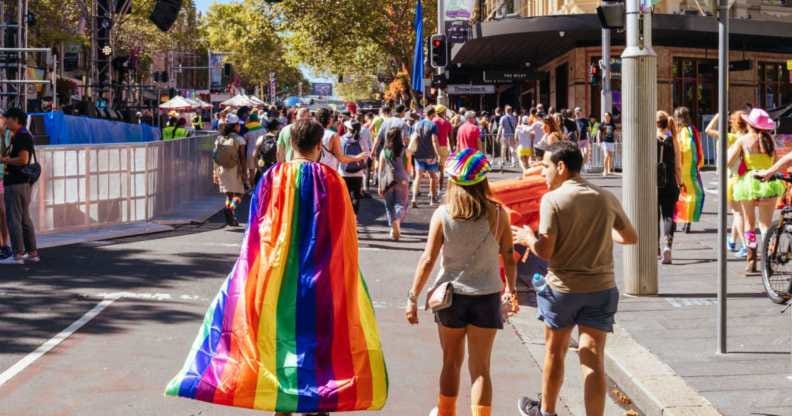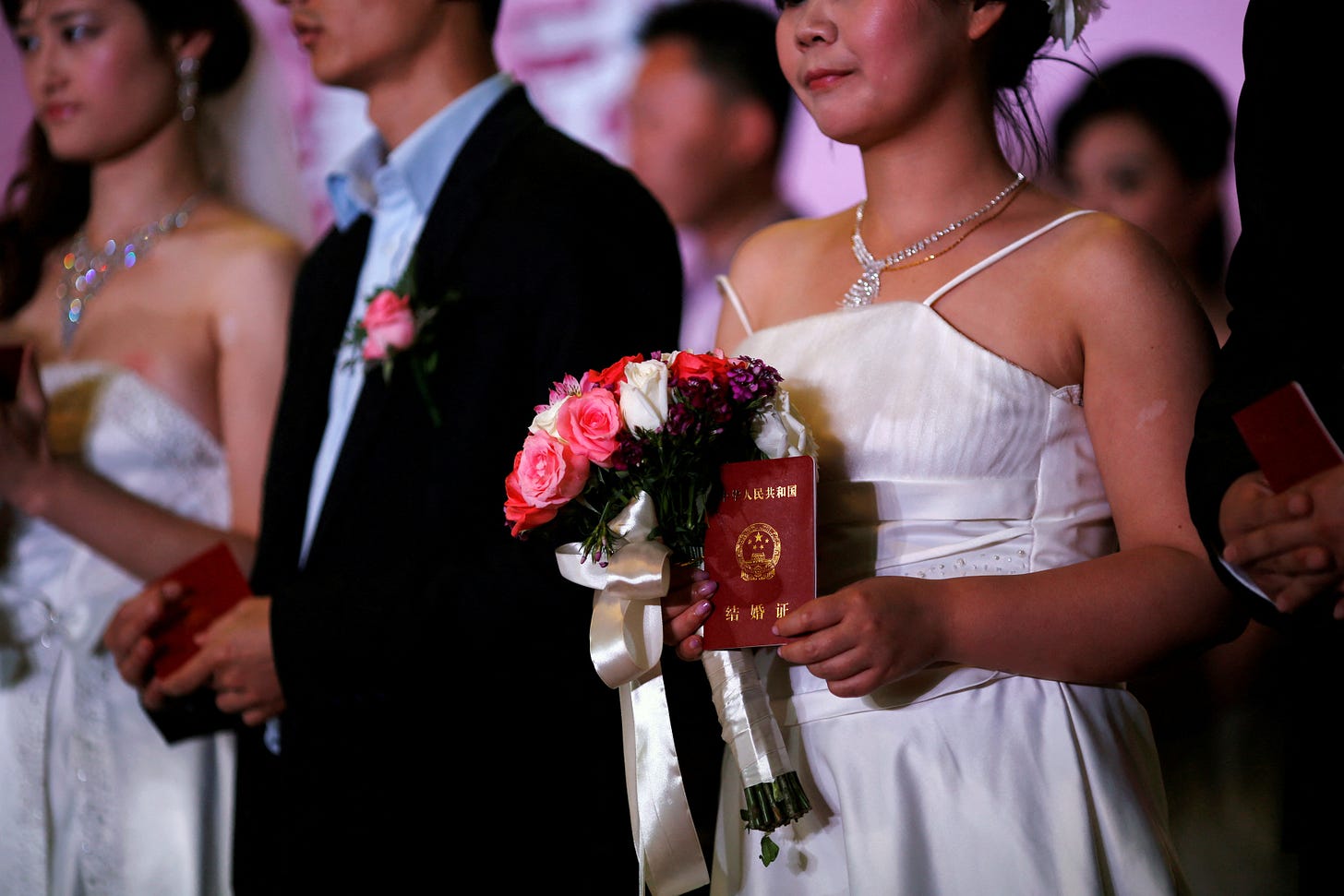Global Roundup: Mexico Decriminalizes Abortion, Rwanda Women Imprisoned for Abortion, Australia LGBTQ+ Activists, China Women Reject ‘Good for Marriage’ Trend, Reviving Indigenous LGBTQ Terms
Curated by FG Contributor Samiha Hossain
A march demanding legal, free and safe abortions in Mexico City in September 2022. Marco Ugarte / AP file
Earlier this week, Mexico’s Supreme Court unanimously ruled that state laws prohibiting abortion are unconstitutional and violate women’s rights. The ruling came two years after the court ordered the northern state of Coahuila to remove sanctions for abortion from its criminal code, a decision which prompted a tortuous state-by-state process of legal battles. So far 12 of Mexico’s 31 states have decriminalized the procedure.
The court’s decision marked a major victory for the GIRE, a reproductive rights organization based in Mexico City, which brought the test case against the Mexican state as part of a years-long campaign for reform. Mexican women on social media celebrated the victory, posting green heart emojis, in a reference to Latin America’s burgeoning feminist movement.
It feels like a dream. Like I’m the happiest person alive right now. If you don’t have the ability to give birth, you can’t tell me whether you think it’s right or wrong. -Andrea Hernández, feminist activist in Mexico City
But the ruling will not automatically make decriminalization the law of the land. Mexico’s two congressional chambers will now need to come together to pass an accompanying law, eliminating abortion from the country’s penal code. This process could be fast, or it could take years. However, Wednesday’s ruling will protect both women seeking abortions and healthcare workers involved in providing abortion care from criminal charges. Anyone with a uterus should also now be able to access abortions in federal health facilities across the country.
The court decision marks an important milestone for Mexican feminists, who continue to protest against the country’s catastrophic rates of femicide, sexual assault and domestic violence. Every year on International Women’s Day, women’s rights groups hold a march in Mexico City, attracting tens of thousands dressed in purple and green. This past year, several women held a banner asking the government for legal abortion access.
We’ve seen rates of femicide rise since 2006 and even more since 2014 – and that’s just one of the many difficult things Mexican women continue to face. -Gina Jiménez, researcher at Data Cívica
These Rwandan women were imprisoned for having abortions, before they were pardoned and released in 2019. From left: Nyiramahirwe Epiphanie, 26, was sentenced to 15 years. Akingeneye Theopiste was sentenced to 10 years. Akimanizanye Florentine was sentenced to 10 years. Mushimiyimana Anjerike, 29, served more than five years for inducing an abortion using pills she says she bought at a pharmacy.
Sarah McCammon/NPR
The nation began loosening its strict abortion laws in 2012, allowing the procedure to be obtained legally from a doctor under limited criteria such as rape, incest, and medically dangerous pregnancies. More recently, a ministerial order that took effect in 2019 further relaxed some of the rules, removing requirements that abortion seekers obtain a judge's approval and stating that sexual assault victims do not have to prove they've been raped in order to receive a legal abortion.
As part of this new approach, the Rwandan government since 2016 has pardoned and released more than 500 women who were incarcerated for abortion-related convictions. The government says 123 women remain incarcerated for undergoing an abortion but are likely to be released by next year. But for those who are released, reintegration into Rwandan society remains challenging.
The burden of those convictions has fallen disproportionately on lower-income women, says Sengoga Christopher, director of HDI's Center for Health and Rights. For many reasons, including lack of information and access to health care, he says poor women in Rwanda are more likely to face prosecution and incarceration for abortion. They're also more likely to use unsafe methods, which he deems a "double injustice."
Mushimiyimana Anjerike, from northern Rwanda, says it was her neighbors who made sure she went to prison for her abortion. Now 29, Anjerike was still in her late teens when she says she became pregnant and was abandoned by her boyfriend. Anjerike says she served five years of a 10-year sentence before she received her pardon. Now married with a young child, she says she and her husband struggle, picking up work as they can carrying materials for builders or digging holes for farmers, to earn enough even to pay for two meals a day. For Anjerike, efforts to expand access to abortion and reduce criminal penalties in Rwanda are necessary steps forward.
In my opinion, when a lady wants to abort, she will always abort. Let it be done in the right way, not going for illegal abortion. -Mushimiyimana Anjerike
Getty Images
Australian activists took over Sydney’s Oxford Street last weekend to protest a recent rise in anti-LGBTQ+ attacks and call for more queer-safe spaces. Hundreds of protesters from groups like the National Union of Students and Pride in Protest, were joined by allies, drag performers, and other activists to march down Oxford Street before listening to speeches. The demonstration was a response to a recent spike in reports of homophobic and transphobic behaviours in Sydney.
The ‘Whose Street? Our Street!’ protest called for the New South Wales government to provide safeguards for LGBTQ+ citizens by fast-tracking the state’s proposed equality bills. The Equality Legislation Amendment Bill 2023 would update the state’s anti-discrimination laws to protect LGBTQ+ people, modernise the language in a number of laws, and allow people aged over 16 to register a change of sex or gender. This bill, along with a second that would outlaw gay conversion therapy and other suppression practices, has been tabled for the time being, with plans to look into them again at the end of 2023.
Us being on this street tonight, we are saying we will not wait. Pass the Bill immediately. -Charlie Murphy, activist
The protest came just one day after a separate LGBTQ+ event was shut down in Sydney’s Bankstown area following an upsetting attack. To mark Wear It Purple day (an annual LGBTIQA+ awareness day especially for young people), a pop-up stall had been set up in a shopping centre, offering support and advice to LGBTQ+ youth, as well as a drag story time event and an appearance from comedian and drag performer Carla from Bankstown. However, the pop-up was abruptly shut down over safety concerns after a group of men were seen tearing down LGBTQ+ flags, shouting abuse, and generally causing trouble.
A woman holds her marriage certificate as couples participate in a staged mass wedding, organised as part of a matchmaking event to inspire singles to get married, in a suburban area of Shanghai May 18, 2013. REUTERS/Carlos Barria
A fashion trend in China dubbed "good for marriage" has generated a social media storm, with scores of women saying the demure, feminine style plays to gender stereotypes and discourages financial independence. The trend recently became popular after several social media influencers promoted ways they said would make women more attractive to potential husbands.
I'm desperately working towards the "difficult to marry style". I love exercising, shopping and I'm a super feminist who loves to argue. -Weibo user
The pastel make-up and modest clothing that are the hallmark of "good for marriage" style are based on "Brilliant Girls", a 2021 drama that centres around a woman who wants to get married as quickly as possible. In Chinese, the trend literally translates as "good family tradition". Traditionally, women are seen as the primary carers for their children and households. Many young Chinese women cite high childcare costs, a disrupted career and not wanting to get married as the main reasons for not wanting children.
Chinese Officials, however, grapple with ways to boost the number of marriages, and births, which dropped to record lows last year, leading to the first decline in the population in six decades.
I am so happy alone. Super happy! Be a hard-to-marry girl, sensible, self-interested, loves herself. -Weibo user
Benny Michaud refers to themselves as a tasta-ee-iniw, which means a person who is “in-between” in the Michif and Cree languages. (Submitted by Benny Michaud)
Benny Michaud from the Métis community of St. Boniface in Winnipeg, Canada, refers to themselves as a tasta-ee-iniw, which means a person who is "in-between" in the Michif and Cree languages. In recent decades, many LGBTQ Indigenous people have begun using the umbrella phrase "two-spirit," while others are embracing terms from their own nations, in their own languages.
For me, that's a term that is really important, because I find that it allows that part of me that I value to be understood by other people. So, it helps to locate me within the many genders that exist in the world as being somebody that is not a woman and not a man, but someone that is sacred and that deserves a place within the circle and deserves to be respected as a sacred being among all other beings in Creation. -Benny Michaud
Traditionally, two-spirit people in Indigenous communities would fulfill various roles in society, and this still holds true in some places. Two-spirit people were caretakers of children and the elderly, medicine people, matchmakers, treaty negotiators, beaders and dancers. Colonialism then introduced the idea that there are only two genders.
While living in Regina, Melody Wood began to understand the traditional way of life, and an Elder shared with her the term nāpēkan, which means "man-like" in Cree. Wood now lives in Saskatoon, working at the Aboriginal Friendship Centres of Saskatchewan where she mentors two-spirit youth for OUTSaskatoon. She has spent most of her adulthood raising other people's children — once a traditional role of two-spirit people in some Indigenous communities.
One of the things that has been consistently shared with me is that our cultures, our way of life is embedded in the language. And to truly know and understand our cultures, we need to know the language. -Melody Wood
The term "two-spirit" was first envisioned by Elder Myra Laramee, who proposed its use during the third annual Inter-tribal Native American, First Nations, Gay and Lesbian American Conference held in Winnipeg in 1990. It is a translation of niizh manidoowag in the Anishinaabe language. Albert McLeod was there, too. Long thought of as a "granny" by two-spirit people in Manitoba — and across Canada — McLeod helped form one of the first queer Indigenous groups in the country: the Nichiwakan Native Gay Society, based out of Vancouver. He says the term two-spirit "was that contribution to queer liberation around the world, but also our inclusion in Indigenous communities."
Siihasin Názbaa, a Diné two-spirit water protector, uses the term nadleehi, which means 'the one that changes,' in the Diné language of the Navajo Nation south of the border. Názbaa says the nation believes all individuals should strive for a balance between the masculine and feminine energies. Názbaa was made to feel abnormal by Western doctors and only felt accepted when they went back to their home community, where nadleehi have always held a special place. They said this experience was necessary for them to get back to their language and culture, and better understand their place in the world when it comes to their identity.
We have a language that is inclusive of people who do not fit, like the colonial gender binary. We've always utilized that language to describe different things that in English become gendered. -Siihasin Názbaa
Samiha Hossain (she/her) is an aspiring urban planner studying at Toronto Metropolitan University. Throughout the years, she has worked in nonprofits with survivors of sexual violence and youth. Samiha firmly believes in the power of connecting with people and listening to their stories to create solidarity and heal as a community. She loves learning about the diverse forms of feminist resistance around the world.








